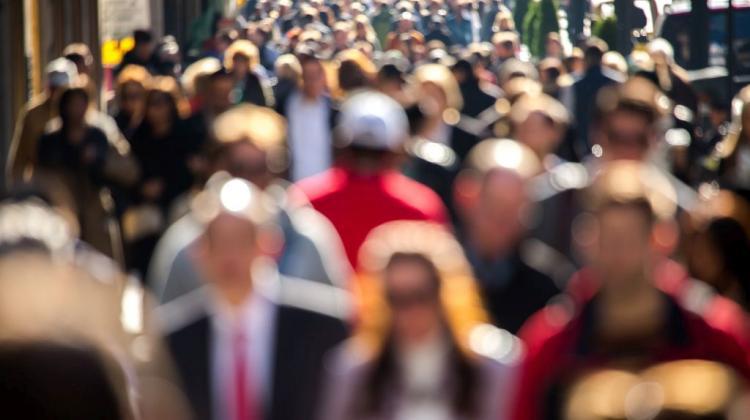Psychologist: We are not able to function without stereotypes
 Photo: Fotolia
Photo: Fotolia
We are not able to function without stereotypes and we cannot completely eliminate them, because they help us function by simplifying the world, says Dr. Marta Kucharska from the Institute of Psychology of the University of Lodz.
But the more aware we are of the stereotypes we are guided by and the stereotypes that are applied to us, the beliefs that shape our behaviour - the more our perspective expands and the more we can counteract the harmful effects of stereotypes, the psychologist adds.
A stereotype is an excessive simplification, generalization referring to a given group or specific members of a given group. It means assigning specific features, traits and characteristics to given persons only because they belong to a given group.
There are different types of stereotypes, for example ones related to racial divisions, being a member of a particular nation, eye colour, external appearance; health, being a representative of a given professional group, or gender stereotypes.
"And even if they have a positive meaning, such as the stereotypes, according to which Poles are very hospitable and Italians are great cooks, they are always excessive simplifications, and as such they can be harmful to someone. They can even be, and often are, offensive" - emphasises the psychologist.
But - in her opinion - we should not demonise stereotypes and instead realize that by categorizing reality and dividing people into subgroups, stereotypes facilitate the processes of thought and explain the world.
Stereotypes also save time. "When you meet someone, you assign them to a certain category, make such a quick screening, decide whether you want to have contact with them. And then you either devote your time to this acquaintance or not" - adds Dr. Kucharska.
It is also related to the first impression effect, shaped by evolution. When a primitive man leaving his cave encountered another living being - he had to decide in a split second whether it was a friend or foe. A wrong decision could mean death.
"Today, when we go to the movies, to the university or to a new job - and we have this first impression effect, that is, we evaluate the newly-met person in a very short time - we do not decide whether it is an enemy or a friend But we still often assess dichotomously: is this person smart or stupid, pretty or ugly, helpful or not. What`s more, if we assign a trait to someone, due to the +halo+ effect, radiation of this trait, we are more inclined assign other positive or negative traits to that person" - explains the expert.
Stereotypes are typically difficult to change. This is due to the fact that we like to see ourselves as people who are committed, consistent and firm in our opinions. "Therefore, our brain, our cognitive filters choose those behaviours of a given person or group that confirm our opinion about a given group. Moreover, if there are any ambiguous situations, we will interpret them to confirm that we are right" - notes Dr. Kucharska.
According to the psychologist, stereotypes not only make life easier, but also have an adaptive function. "If I know how to behave in a given group, or towards a given group, then my adaptive abilities increase. That means that I can predict, for example, how I should address people, what I can and can not do" - she says.
"They also have an identity function. If I belong to a group, it gives me a certain identity, defines a part of who I am, and - in my opinion - also defines other people who belong to groups other than mine" - she explains.
According to the expert, people often manipulate stereotypes. Although they do not like to be judged based on stereotypes, they sometimes use stereotypes to get something for themselves. For example, a woman can use the stereotype of being delicate and weak to ask someone to change a tire in her car, even though she can do it herself, but she simply does not want to get her hands dirty.
According to the psychologist, we justify our behaviour with stereotypes, which makes it easier for us to build an image of ourselves and gives us a sense of security. Stereotypes can also have a protective function. "If we can predict how a given group can behave towards us, we can, for example, avoid danger" - she adds.
Dr. Kucharska emphasizes that stereotypes are always harmful and can do a lot of harm. You can see that every day.
We usually categorize based on the "us and them" division, where "we" belong to one group and we feel that this group is composed of individualists, while we treat the other group as a mass and fail to see any real differences between its members.
"As a result, we do not give ourselves a chance to get to know these people, find out who they are. That is the biggest problem associated with stereotypes, because later - if there is an emotional element - we are dealing with prejudices. And if behaviour follows convictions and emotions, then we may be dealing with discrimination. That is, of course, something that we should fight against, counteract" - emphasises the psychologist.
How to counteract this? In her opinion, the solution is to raise awareness, because lack of knowledge is the main reason for the formation of stereotypes, completely unsupported by real behaviours.
One method may be, for example, creating (based on a contact hypothesis) mosaic groups, consisting of representatives of different groups/communities at an equal level, and giving them tasks to carry out jointly.
"This creates an opportunity for them to get to know each other in completely different circumstances. It very often it turns out that such people have more in common than there are divisions between them" - she explains.
The psychologist admits that people can not function without stereotypes and are not able to completely get rid of them, because stereotypes have important functions in life. On the other hand - as she emphasises - the more aware people are of the stereotypes that guide them, the stereotypes that exist about them, the beliefs that shape their behaviour - the more their perspective expands and the more they can counteract the harmful effects of stereotypes.
"We should try to be open, look at the world from the perspective of another person, and I think that then we will avoid the harmful aspects related to stereotypes" - concludes Dr. Marta Kucharska from the University of Lodz.
PAP - Science in Poland, Kamil Szubański
szu/ zan/ kap/
tr. RL
Przed dodaniem komentarza prosimy o zapoznanie z Regulaminem forum serwisu Nauka w Polsce.
















